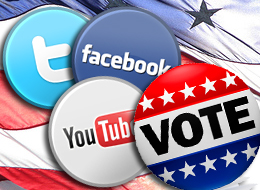 In the "Digital News Report 2016" our class learned that more than a quarter of 18 to 24 year-olds said that social media is there main source or news. Since social media has rapidly become the main source of news, it is not surprising that this has also caused a large increase in political coverage of elections on these social media platforms as well.
In the "Digital News Report 2016" our class learned that more than a quarter of 18 to 24 year-olds said that social media is there main source or news. Since social media has rapidly become the main source of news, it is not surprising that this has also caused a large increase in political coverage of elections on these social media platforms as well.
In an article I discovered online, I found that now many congress members are now wanting to create new election rules to regulate social media. Many lawmakers are eager for these regulation due to the recent discovery that Facebook, one of the largest social media platforms, possibly interfered with the elections by allowing foreign countries to buy political advertising on the site. Russia was behind these particular political advertising purchases on social media and it in the article it was described what the firm behind this did. Boylan, the author of the article explained, "...the Internet Research Agency drove a disinformation campaign during the election, spraying out waves of of divisive 'fake news' focused on controversial American social issues including gun control, immigration, race and gay rights" (Boylan 2017).
This discovery is very disconcerting due to the fact that social media is proven to be the main source of news for many young adults and only seems to be growing. I agree with the fact that there needs to be some type of regulations set in place for social media platforms regarding elections, so that these can be places where news is more unbiased and factual.
*News Article: http://www.washingtontimes.com/news/2017/sep/11/congress-members-want-social-media-platforms-to-ha/
 The idea of algorithm technology seems to have been taken to an entirely new spectrum by Netflix with a new interactive technology they developed. This interactive technology created for television allows viewers to "choose-your-own-adventure" and lets users have the option to alter the plot of a television show, so it heads in a different direction.
The idea of algorithm technology seems to have been taken to an entirely new spectrum by Netflix with a new interactive technology they developed. This interactive technology created for television allows viewers to "choose-your-own-adventure" and lets users have the option to alter the plot of a television show, so it heads in a different direction.
This article focuses on the scenario of this technology being used with the news and the possible outcomes it might have. It is explained in the article that technology is already headed in the direction of self-selection with electronics available today. The author Rutenberg states"...people are being primed to shape the arc of the narratives on their highly personalized electronic screens to suit their own tastes, even if it means banishing inconvenient facts." These current technologies already are leading to people having different and skewed views of the same information. This interactive technology could lead to even more contradictions of information in the news or even worse, news that is inaccurate based on the plot line you choose.
In the article, Rutenberg describes a political news scenario that involves the use of this new technology and how three different "plot" options (Adventure A, B, and C) would play out. In this scenario he created, Adventure B is the plot option that is based on real life facts and is the most accurate account of the certain news story he chose. He goes on to describe, "One of the plots we’re talking about here is of the sort that democracy depends on — that would be Adventure B, the one based on established facts that exist in the real world — and the others are of the sort that threatens to undermine any shared sense of truth while driving us into our corners." I believe that this is a great explanation of the impact this type interactive technology would have with our democratic system.
This topic of this new interactive technology sparked my interest, because it seems to be a somewhat of a contradiction to one of the reforms that Bennett listed in our text. He suggest that "the use of interactive technologies" could help the media more effectively serve the needs of democracy, but this does not seem to be the case for the technology Netflix developed. In fact, I believe that it does the complete opposite of serve the needs of the democracy because it seems as if it could end up diminishing most shared unbiased information depending of the direction you choose.
*News article: https://www.nytimes.com/2017/03/12/business/media/mediator-personalized-feeds-news-choice-jim-rutenberg.html
Hello,
Welcome to my blog! This is my first post, so I thought I would start off with describing my page a little! My blog is titled Live Wire Politics and there is actually a couple different meanings behind this name....
My first initial reason why I named the blog Live Wire was because it makes me think of a source who is going to deliver fast and current news, kind of like the speed of an electric current in a wire.
The second meaning behind my blog title can be found in the Merriam-Webster online dictionary. The definition of live-wire is: "an alert, active, or aggressive person." I think that this definition describes the qualities that a successful political blogger/journalist is very likely to possess in both personal and work-related instances.
Finally, this class is about the connection between mass media and politics and these topics would not be related to one another or possibly even exist if it weren't for technology. So, I thought I would showcase this important connection by centering my blog theme around technology.
Since my blog has a technology based themes I am going try and focus on politics and their relation to mass media and technology, but if other topics catch my eye I may also post about these as well!
*Question to Ponder: what do you think politics would be like today if technology was never invented and there was no such thing as the mass media?*
 In the "Digital News Report 2016" our class learned that more than a quarter of 18 to 24 year-olds said that social media is there main source or news. Since social media has rapidly become the main source of news, it is not surprising that this has also caused a large increase in political coverage of elections on these social media platforms as well.
In the "Digital News Report 2016" our class learned that more than a quarter of 18 to 24 year-olds said that social media is there main source or news. Since social media has rapidly become the main source of news, it is not surprising that this has also caused a large increase in political coverage of elections on these social media platforms as well.